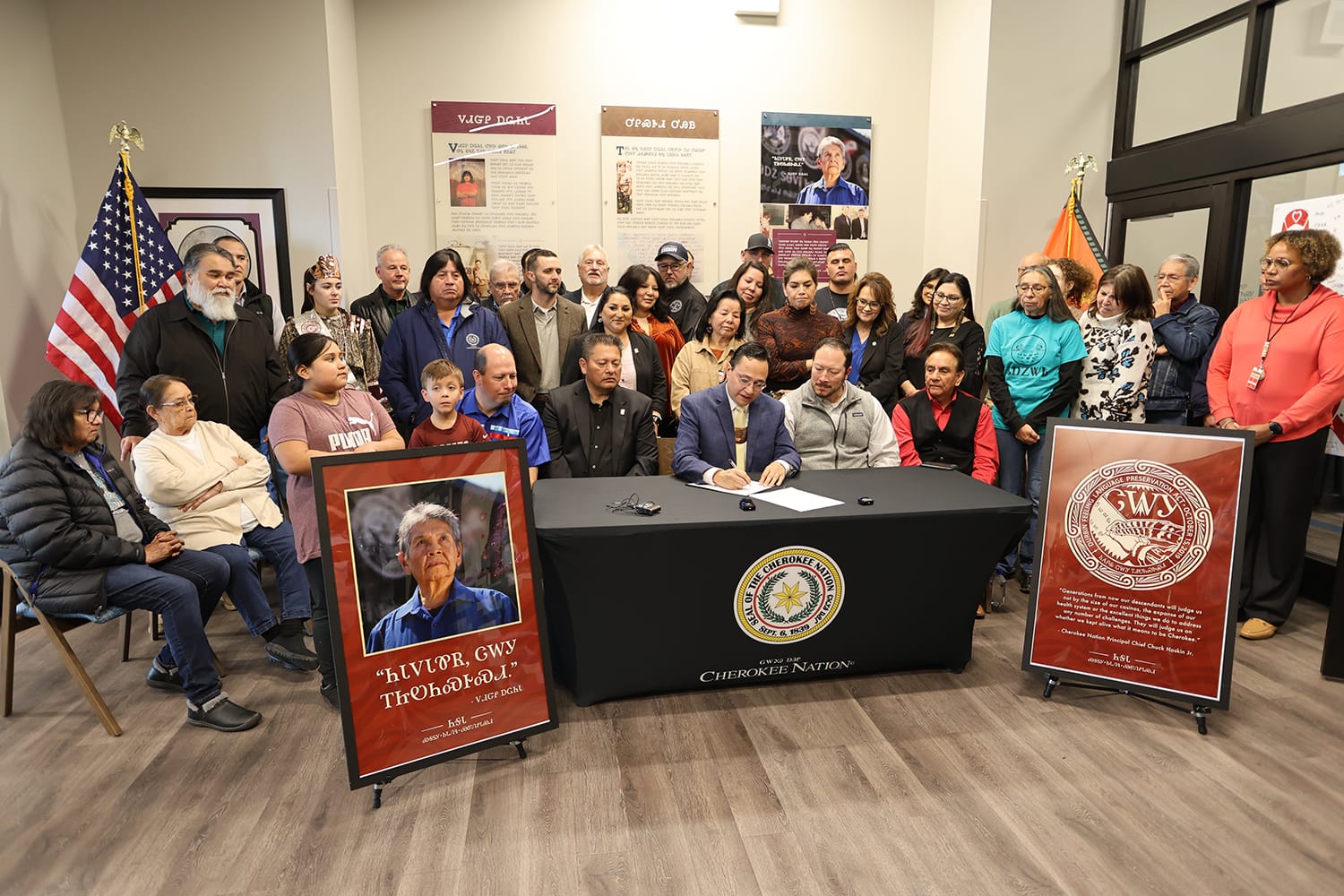
Cherokee Council unanimously supports Chief Hoskin, Deputy Chief Warner proposal for tribe’s largest language investment
TAHLEQUAH, Okla. — Leaders of the Cherokee Nation gathered on Wednesday, Jan. 24, to celebrate the permanent reauthorization of the historic Durbin Feeling Language Preservation Act inside the Durbin Feeling Language Center in Tahlequah.
The landmark 2019 law is helping revitalize the Cherokee language and represents the largest language investment in Cherokee history. The permanent reauthorization, proposed by Chief Hoskin and Deputy Chief Bryan Warner and approved by the Council of the Cherokee Nation on Monday, authorizes a minimum operating funding budget of $18 million annually.
“The permanent reauthorization of the Durbin Feeling Language Preservation Act shows our commitment to preserve the Cherokee language and keep alive a piece of our tribe’s heritage for future generations,” Principal Chief Chuck Hoskin Jr. said. “Deputy Chief Bryan Warner and I could not be more thrilled to have the support of the Council of the Cherokee Nation on this vital initiative. It’s the Cherokee belief in gadugi, the power of working together, that will enable us to continue to preserve our Cherokee lifeways.”
The new legislation deems the loss of the Cherokee language to be a national emergency for the Cherokee people and, along with the minimum annual funding, includes:
- $35 million in new capital projects, including a proposed $30 million Cherokee language immersion middle school to extend enrollment and space for the current pre-K through 8th-grade language immersion program.
- Formal designation of language campuses in Tahlequah and Greasy as well as a new language satellite office in Kenwood.
- Authorization of eight core language programs and services.
- Protection of more than 1,400 acres of trust land in Delaware County as the “Kenwood Cherokee Language and Culture Preserve,” to be developed in the future as a new language campus.
- A required biennial “State of the Cherokee Language” report to measure the progress of language programs and strengthen accountability for success.
“The key to revitalizing our precious language comes down to the resources we commit toward that effort, and so we will not be shy when it comes to our commitment,” Deputy Chief Warner said. “The permanent reauthorization of the Durbin Feeling Language Preservation Act is bold in intent and further demonstrates how much our tribe prioritizes the protection and teaching of our language. It is the largest language investment in Cherokee history.”
Howard Paden, the tribe’s Executive Director of Language Programs, said Cherokees will one day look back in time and recognize the reauthorization of the Durbin Feeling Language Preservation Act as a pivotal moment for the Cherokee language.
“Future generations of Cherokees will remember this time as the moment their ancestors persevered, and out of the ashes, our original design purpose created by ᎤᏁᏝᏅᎯ (unetlanvhi, the Creator) was not forgotten but reborn,” Paden said. “The revisions of this Act provide for a new immersion middle school in Tahlequah, a new language and culture reserve for the future Kenwood Language Campus covering over 1,400 acres, and investments in our existing Greasy campus. These investments and other key provisions, such as minimum annual operating funding, enables us to surpass our current language revitalization efforts. All of this means we are committing more resources to revitalize our language in Cherokee history and we are even exceeding any federal funding committed to this.”
Cherokee Nation estimates that it has fewer than 2,000 first-language fluent speakers remaining and most are over the age of 70.
Since 2019, the Durbin Feeling Language Preservation Act has expanded various language programs, created new language programs and services, and funded the construction of the $20 million Durbin Feeling Language Center in Tahlequah.
The 2019 law also led to the opening of a second immersion campus in the Adair County community of Greasy, quadrupled the size of the Cherokee Language Master/Apprentice Program, constructed a “speaker village” in Tahlequah, and established a new Speaker Services program to address quality of life issues for elder fluent speakers.
“On behalf of the Tribal Council, we are honored to support this law,” said Cherokee Nation Council Speaker Mike Shambaugh. “I think it’s an ongoing testament to how our administration and our Council supports our Cherokee people of all ages, whether it be our young second-language learners in our immersion schools or our elder first-language speakers who also serve as vital pieces to the preservation of our language.”
The law is named for the late Durbin Feeling, a Cherokee linguist regarded as the modern-day Sequoyah. Feeling passed away in 2020.
“Durbin would be so excited today because preserving the Cherokee language was his lifelong dream,” said Christine Feeling, wife of the late Durbin Feeling. “He preached the importance of protecting our language to the Council and anybody he could find that would listen to him. Chief Hoskin was one of those who listened and promised he would do everything he could to follow through on Durbin’s dream to revitalize the language.”
Chief Hoskin first proposed reauthorizing the Durbin Feeling Act during his State of the Nation Address in September and again at the historic gathering of fluent speakers in Tahlequah in October.





